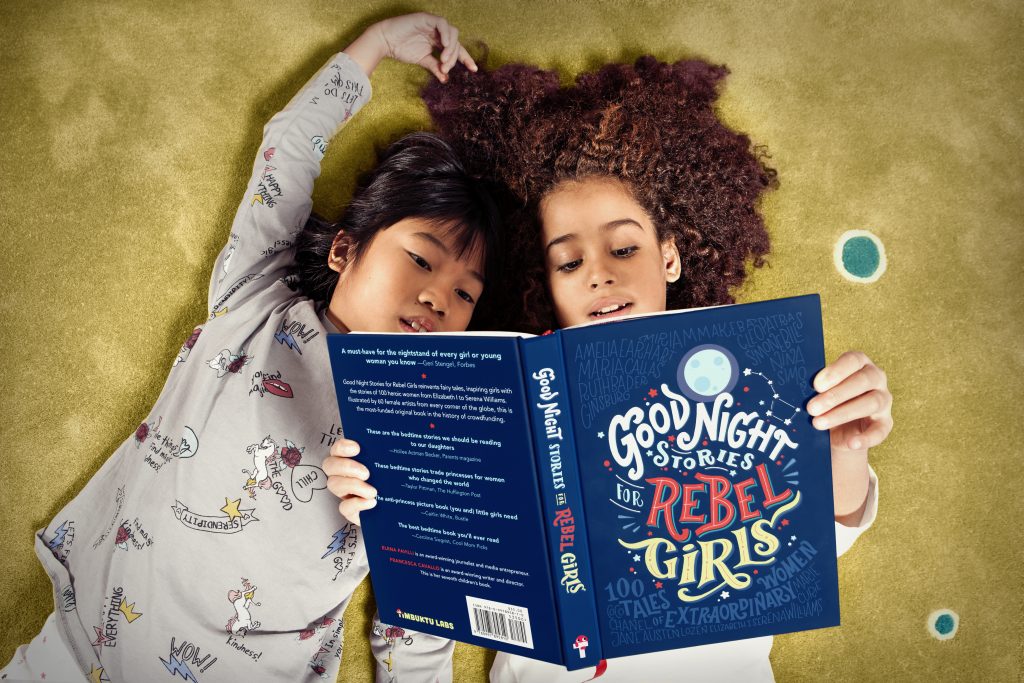By Khadija Kothia, BA History
Fairy-tales. The classic story of the helpless princess, locked up and waiting to be saved by her handsome, golden-haired Prince Charming. A story unavoidable in childhood, and in an increasingly gender-equal society, a tale somewhat unsatisfactorily anachronistic against the barrage of increasing feminist campaigns.
Francesca Cavallo and Elena Favilli aim to do the same. Aspiring to reinvent the traditional boys saves girl narrative, their new book, Goodnight Stories for Rebel Girls, instead helms the “heart-warming and thought-provoking” real-life stories of 100 “heroic” women.
Bound together in a hardback, sleek cover, the book is indeed a spectacle. Enveloped in vibrancy, each page is etched in beautifully intricate illustrations of each heroine. Side-by-side and page-by-page, the women stand, embodying all ages, sizes, colours, nationalities and talents. From Serena Williams, to Nina Simone, Malala Yousafzai to the Bronte Sisters; the diversity of watercolour strokes alongside bold, acrylic portraits perfectly captures the sheer multitude of female achievement and triumph.
In fact, the entire concept of the book is very much a celebration of female accomplishment. The feel-good stories of achievement are accompanied by the collaboration, not only of 60 female illustrators, but also the joint contributions of over $1 million, making this rewarding effort the most crowd-funded original book in history and a visual representation of the power of the growing feminist movement.
But for all the showers of praise and never-ending scrolls of positive reviews, the book does not come without its unfortunate discrepancies. In place of the conventional sexist rhetoric that the book aims to override, the ‘boys will be boys’ stereotype instead becomes the tale of Zaha Hadid, who once upon a time, unapologetically threw a fit of anger in response to plane delays, and demanded to be escorted off because, ‘that was just who she was’. For all the current promotion of body positivity campaigns comes the story of Maria Callas, who in a land far away, was a clumsy girl who believed her mother loved her prettier, slimmer sister far greater than her. Perhaps most strikingly, for all conversation of gender-fluidity and non-binary categories, the tale of a transgender child, asking to be “fixed” into a girl for loving “dresses, the colour pink and shiny shoes”, brought to explosive life.
However, that is not all, for if the narrative could not be more questionable, the choice of “inspirational women” raises even more concerns. Promoting her “message of democracy and peaceful change” is Aung San Suu Kyi, a figure silent over the persecution of the Rohingya Muslims within her state. Pirates, smugglers, and controversial politicians such as Margaret Thatcher and Hillary Clinton are also given mentions, watered down to rosy fairy-tales of individual success and, as a result, raising question marks over what type of ‘rebel girl’ Cavallo and Favilli are aspiring to encourage.
For all the heart-warming stories of strength and inspiration that the book aims to conjure up, digging beyond the collection leaves the sceptical reader with a rather unsatisfactory residue. For the young girl, the book is great. Bright, vibrant and with a variety of bed-time stories to choose between. However, the stories are arguably short, somewhat repetitive, and with the inclusion of a large number of controversial figures, one wonders how the young, impressionable girl would react to growing up and realising the not-so-rosy truth of the inspirational figures she grew to admire in Good Night Stories for Rebel Girls.
A fairy-tale ending, not so happily ever after.
